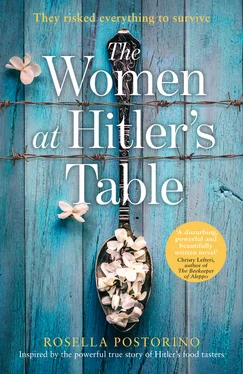“Line up!” the guards ordered. “The hour is over.”
We quickly rose to our feet. Augustine’s little scene had captivated the other women, but their desire to leave the lunchroom was even stronger. Once again, we were going back home safe and sound.
As I joined the line, Ulla touched my elbow. “Thank you,” she whispered, and ran off ahead.
Elfriede was behind me. “This isn’t a boarding school for women, Berliner, it’s a barracks.”
“Mind your own business,” I was surprised to hear myself say. The back of my neck instantly flushed. “You’re the one who taught me that, remember?” It sounded more like an excuse than a provocation. I wanted to get along with Elfriede rather than clash with her, though I didn’t know why.
“In any case,” she said, “the kid’s right: there’s nothing funny about those books, unless you get a kick out of learning the symptoms caused by various forms of poisoning. Do you enjoy preparing for death?”
I kept walking, without replying.
That night I washed the wine-colored dress for Ulla. Giving it to her wasn’t an act of generosity or even a ploy to make her like me. Seeing it on her would be like scattering my life in the capital into Gross-Partsch, dispersing it. It was resignation. Three days later, I gave it to her, dried, ironed, and wrapped in newspaper. I would never see her wear it to the lunchroom.
Herta took my measurements and altered some of her own dresses for me, narrowing the waistline and shortening the back hems slightly, at my insistence. That’s the fashion, I explained. Berliner fashion, she retorted, pins between her lips like my mother and not even one scrap of thread on the floor of her country house.
I kept the checkered dress in the wardrobe that had belonged to Gregor, along with all my work clothes. My shoes were the same— Where are you going in those heels? Herta said reproachfully—but only with them on could I recognize my own footsteps, no matter how uncertain they had become. On foggy mornings I would sometimes pull out the checkered dress, gripping the hanger angrily. There was no need for me to blend in with the other tasters, we had nothing in common, why did I care about being accepted by them? But then I would glimpse the dark circles under my eyes and the anger would wither to despondency. Putting the dress back in the darkness of the wardrobe, I would close the door.
They had been a warning, those circles under my eyes, and I hadn’t grasped it, hadn’t foreseen my fate, blocked its path. Now that death was finally upon me, there was no longer room for the little girl who sang in the school choir, who went roller-skating with friends in the afternoon, who let them copy her geometry homework. Gone was the secretary who had made the boss fall head over heels for her. Instead there was a woman whom the war had suddenly aged. That was the fate written in her blood.
THAT NIGHT OF March ’43, the night my fate had taken a sharp turn for the worse, the air-raid siren had gone off with its usual whine, the smallest run-up and then a leap, just long enough for my mother to roll out of bed. “Rosa, get up,” she urged me. “They’re bombing.”
When my father died, a year and a half after we entered the war, I had begun to sleep in his place beside her. We were two adult women who had both experienced everyday familiarity with the marriage bed, had both lost it, and there was something profane in the similar smell of our two bodies beneath the covers. Still, I wanted to keep her company when she woke during the night, even if the siren wasn’t going off. Or maybe I was afraid to sleep all alone. That’s why, six months after Gregor had gone off to war, I had rented out our apartment in Altemesseweg and moved back in with my parents. I was still learning the ropes of being a wife and already I had to stop that and become a daughter again.
“Hurry,” she said, seeing me search for a dress, any dress, to change into. She threw her coat on over her nightgown and headed down in slippers.
The siren was no different from the previous ones, a long wail that built up as though to last forever, but after eleven seconds it diminished in tone, abated. Then it started up again.
All the ones before it had been false alarms. Each time we had run downstairs with our flashlights on, despite the blackout orders. In the dark we would have tripped over the other tenants, bumped into them as they too headed for the cellar, carrying blankets and children and canteens filled with water, or descended terrified and empty-handed. Each time we had found a tiny patch for ourselves on the floor and sat down beneath a dim, bare lightbulb that dangled from the ceiling. The floor was cold, the people cramped, the dampness sinking into our bones.
Huddled against one another, we who lived at Budengasse 78 wept and prayed and cried for salvation. We urinated in a bucket too close to the eyes of the others, or held our bladders though they were ready to burst. A young boy bit into an apple and another boy stole it out of his hand, taking as many bites as he could before the first boy snatched it back and slapped him. We were hungry and sat there in silence or dozed, and would reach the dawn with haggard faces.
Soon afterward, the promise of a new day would drift down onto the light blue façade of our stately building in the outskirts of Berlin, making it glow. Hidden away in the depths of the building, we couldn’t see that light, much less believe it possible.
As I raced down the cellar stairs with my arm around my mother on that March night, I wondered what note it was, the sound of the air-raid siren. As a girl I had sung in the school choir, the teacher had complimented my pitch, the timbre of my voice, but I hadn’t studied music, so I couldn’t tell the notes apart. And yet, as I nestled down in my spot beside Frau Reinach with her brown kerchief on her head, as I stared at Frau Preiß’s black shoes deformed by her bunioned big toe, at the hairs sticking out of Herr Holler’s ears, at the Schmidts’ son Anton’s two tiny front teeth, and as my mother’s breath— Are you cold? she whispered to me. Bundle up —became the only profane yet familiar smell I had to cling to, all that while the only thing that mattered to me was finding out what note corresponded to that long blare of the siren.
The rumble of planes overhead instantly banished the thought. My mother squeezed my hand, her nails piercing my skin. Pauline, who was barely three, stood up. Her mother, Anne Langhans, tried to pull her down, but with all the obstinacy of her scant ninety centimeters the little girl broke free. She tilted back her head and looked straight up, turning around as if to seek the origin of the sound or follow the plane’s trajectory.
The ceiling shuddered. Pauline toppled over as the floor lurched, a deafening hiss drowning out every other sound, including our screams, her cries. The lightbulb flickered out. A massive explosion burst into the cellar, caving in the walls, hurling us every which way. The blast sent our bodies flying through the air, slamming into one another, tangling together as the walls spewed plaster.
After the bombing ceased, sobs and shouts reached our injured eardrums, muffled. Someone pushed on the cellar door. It was blocked. The women shrieked, the few men present kicked it again and again until finally it burst open.
We were deaf, blind, the dust had masked our features, made us strangers even to our own parents. We searched for them, calling out, Mother, Father, unable to utter any other words. My eyes saw only smoke. And then Pauline: she was bleeding from the temple. I tore the hem off my skirt with my teeth and stanched the wound, tied the strip of fabric around her head, looked for her mother, looked for mine, recognized no one.
Читать дальше












